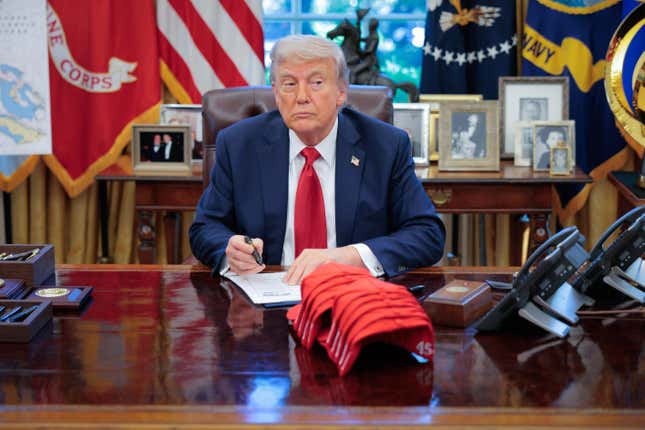
The public’s perception of President Donald Trump’s economic policies continues to fall, with a new poll showing that most Americans think tariffs will mean higher prices. They also think a recession is likely.
About 60% of U.S. adults think Trump’s broad and ever-changing tariffs have gone too far, and three in four think his trade policies will increase the prices of U.S. consumer goods, according to an Associated Press-NORC Center poll conducted a few days ago. Just under half of survey respondents believe Trump’s trade policies will increase the cost of U.S. consumer goods by “a lot.”
Only four in ten Americans approve of how the president has been handling the economy and trade negotiations — and his administration hasn’t even passed the 100-day mark.
Concerns about a potential recession remain pervasive. About half of Americans are “extremely” or “very” concerned about an impending recession. Meanwhile, 61% are concerned about the cost of groceries, and 51% worry about the cost of big-ticket items.
These economic concerns echo findings from a Federal Reserve survey last week that said Americans’ view of the economy is bleak — and getting worse. Sentiments around unemployment, job loss, and earnings growth all declined month over month, data from the central bank’s March 2025 Survey of Customer Expectations showed.
In recent weeks, Bridgewater Associates founder Ray Dalio has said he’s worried about “something worse than a recession,”and other CEOs have jumped on board with similar statements — 60% warned in a recent survey that tariffs will rattle the economy.
According to the AP-NORC poll, 52% of U.S. adults are against imposing tariffs on all imported goods, up slightly from January, when a poll found that 46% were against tariffs. The AP found the shift seems to be primarily driven by adults under age 30, who previously didn’t have an opinion on tariffs.
The tariffs have caused the markets to fall — and then rise, and then fall again in a seemingly endless cycle related to uncertainty about the president’s policies and their enforcement. Earnings guidances have been scrapped as companies look for further insight into how the U.S. economy will fare a quarter, or even a month, from now.
Trump has seemed to suggest he’d consider walking back the 145% tariffs he implemented on China, and Treasury Secretary Scott Bessent said the situation with China isn’t “sustainable” in a closed-door speech.